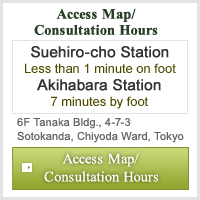トップへ » I am having a difficult time because my partial dentures don't fit
I am having a difficult time because my partial dentures don't fit
Q. The other day I had partial dentures made through health insurance. I am having a hard time because they do not fit.
This problem concerns dentures for my left and right molars on the lower jaw (4 of my left molars and 3 of my right molars are tied together with wire and are holding my dentures in place with spring metal parts). It is so severe that I have not yet been able to keep my dentures in for a whole day. Yesterday I went to the hospital for the first time in a while to fix the parts that were hitting against my teeth. Even though they fixed the parts for me, I still feel like my bite is weak. In fact it is so weak that it is still easier for me to take out my dentures completely when I eat. (Maybe I shouldn't force myself to use dentures at all?) I have had the nerves in my remaining teeth treated and the dentist told me that they are weak.
They kind of float up when I am chewing and they were pretty cheap (about 7000 yen). I suppose for that price I shouldn't expect anything more precise.
A. There are usually 14 bottom teeth, not including the wisdom teeth. So you seem to have lost 7 of those, or half of them, right?
Currently, Japan's health insurance-covered treatment method is to provide dentures that use metallic springs called clasps that hold dentures in by hooking them to remaining teeth. Since these springs are simple devices, it is common to experience an awkward feeling due to the dentures moving as they react to the force of your molars grinding food. Also, since artificial plastic teeth and natural teeth are completely different in hardness and shape, it is thought that these dentures cannot function very well. The grooves of your teeth are not random. They are in fact made according to rules that govern the back and forth and side to side movements of grinding. However, dentures covered by health insurance are made to have flat shapes that make it nearly impossible to grind food.
Everyone has a relaxed position unique to their own mouths (the central position), and if the dentures don't match up to that position when chewing, it can feel awfully awkward. The bite alignment plane is very important and basically should be bilaterally symmetrical. Sometimes when examining a patient whose dentures don't fit, we find that this standard is not met. I think that all of these factors lumped together can cause patients to feel that their dentures just don't fit nicely.
The good thing about the dentures that use clasps is that they are covered by insurance and can be used as false teeth after having teeth extracted. There are a few negative aspects about them though. First, if you use them for too long, the teeth supporting the springs can come loose. This is because every time you attach or detach them, they are placing a burden on your teeth, and whenever you chew food, your dentures wiggle around and in turn the teeth supporting them wiggle as well.
The positioning of the clasps is the same positioning that we dentists place our tools in when extracting teeth. Since the clasps are mimicking these actions slowly and over an extended period of time, before you know it, you could be suffering from loose teeth and symptoms similar to pyorrhea. The result is that you may lose these teeth. Also, these dentures are not so esthetically pleasing since they are riddled with metallic clasps. In Germany, a highly developed nation in denture technology, dentures that use clasps are so outdated that they are no longer even covered in textbooks in dental universities.
+ The bite is so weak that it is easier for me to take out my dentures completely when I eat. (Maybe I shouldn't force myself to use dentures at all?)
In response to this, I would have to say that of course it is better to eat with your dentures in. The reason for this is that the upper teeth and lower teeth maintain a balance when they come together biting. If you remove either top or bottom, your teeth can become weaker or start to extend out due to lost function. It is very difficult to adjust the bite alignment plane of a mouth with teeth that have begun to extend out.
One more thing is that without molars, the jaw joints will deteriorate. Bite alignment and joint movement work as a pair, so without molars there is an incredible extra burden on the joints. Muscle movements that pull on the joints are connected to joints in the neck that support the head. This is why these problems can cause other symptoms such as stiff shoulders, back pain, and headaches.
So is there one treatment method that can solve your problems?
One treatment option relies on implants.
This method calls for inserting a titanium plate into the bone of the jaw to create a foundation. In this patient's case, 7 implants would be placed into this foundation.
But in this case,
+ He has had nerve treatment and the dentist has informed him that his teeth are weak. So in this patient's case, instead of implants, I would recommend dentures made using the Riegel telescope method developed in Germany.
'Riegel telescope' is a type of denture technology from Germany first introduced to Japan by Shigeru Inaba (our clinic's advisor). Advisor Inaba spent a year and a half learning the authentic 'Riegel telescope' method directly from Professor Koerber at Tubingen University in 1978.
Since it requires a high understanding of oral theory and skill, this technology is not yet widely practiced in Japan. So we are working hard to spread knowledge of Riegel telescope.
It would cost 400,000 to 500,000 yen per tooth to replace your lost teeth with implants. It is no wonder that a set of dentures that cost 7000 yen, or 1000 yen per tooth, are causing you discomfort.
トップへ » I am having a difficult time because my partial dentures don't fit









